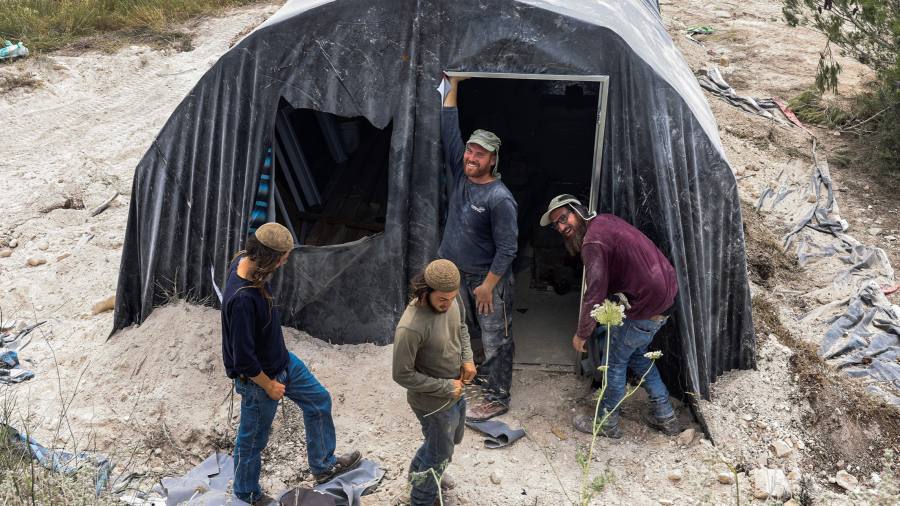Samer Mesoud was working on his farm near Burqa, a Palestinian town in the occupied West Bank, when he received a call warning him that a group of Jewish settlers had set the family’s barn on fire.
Mesoud rushed back, only to have his efforts to control the blaze thwarted by Israeli soldiers who had arrived on the scene and fired tear gas at him as he tried to bring water from a nearby tank. “I told them: go ahead and shoot me,” he said, gesturing around the charred building, melted wire fittings to his right and the ashes of wood and straw at his feet. “This was my livelihood. And now this is it.”
The torching last month — confirmed by Yesh Din, an Israeli rights group — was part of a broader escalation of settler violence against Palestinians under Israel’s far-right government, which took office last December. The rate of attacks by settlers on Palestinians and their property in the first five months of the year was 18 per cent above last year’s level, according to UN data.
Locals in Burqa fear the situation will only worsen as the coalition presses on with plans to expand Jewish settlements in the West Bank, which Palestinians have long sought as the heart of a future state. The international community regards the settlements as illegal. But they have swelled to accommodate more than 500,000 people, and observers say that the advent of Benjamin Netanyahu’s new government has left the settler community feeling emboldened.
In the past five months, the coalition has approved the legalisation of nine settlement outposts that even Israel previously deemed illegal. It has also advanced plans for 7,000 new settlement housing units, pledged billions of shekels for settlements and roads in the West Bank, and transferred key powers over civilian life in the territory to Bezalel Smotrich, an ultranationalist settler and proponent of its annexation by Israel, who was appointed finance minster and given a senior role in the defence ministry.
Last month, the authorities took another high-profile step, allowing settlers to build a yeshiva — a religious school — at Homesh, an illegal outpost overlooking Burqa where a settlement was dismantled in 2005. The move drew condemnation from Washington, as it went against Israeli commitments to the US in 2004 to evacuate the settlement.
“[Homesh] is a game-changer,” said Yonatan Mizrahi, from the Israeli advocacy group Peace Now. “Rather than just closing their eyes to illegal work, like in the past, this government is supporting it. It’s a statement.”
On the Homesh hilltop, the statement has been well received. Menachem Ben Shachar, a rabbi at the yeshiva, said the original decision to dismantle the settlement and three others, alongside Israel’s withdrawal from the Gaza Strip in 2005, had been a capitulation to Palestinian militants.
“They understood it as a prize for them, and now we want to defeat terror and come back to our Land of Israel,” he said, as young men ferried new furniture into the prefabricated yeshiva while soldiers kept guard nearby. “I hope the government will make a legal community here. So far it is only the yeshiva. I want a community with houses and streets.”
For residents of Burqa, that prospect is a disaster. Naser Hijji, an imam in the town of some 5,000 people, said restrictions put in place by the military around Homesh meant locals were already unable to access much of their land. Now they fear further restrictions on movement and even greater difficulties reaching their fields.
“It’s becoming a nightmare,” he said. “People have lost hope [of getting justice] and they have no trust — neither in international law nor in human rights law, nor in the Israeli high court . . . it’s like we are living in the jungle.”
The biggest fear, however, is further violence. This year is on course to be one of the bloodiest in the West Bank in decades, with Israeli forces killing 112 Palestinians in the territory in the first five months of the year and Palestinians killing 15 Israelis, according to the UN.
Hijji said that in recent months settlers had destroyed scores of olive trees in Burqa, depriving farmers of a key source of income, and carried out numerous attacks on property.
“The settlers now feel that they’re empowered and they’re the ones who are controlling the army. It’s not the other way around,” said Ghassan Daghlas, an official from Burqa who monitors settler activity in the West Bank. “[Israel] has been shifting more and more to the right . . . and we’re the ones who are paying the price of their electoral choices.”
Ben Shachar denied settlers from Homesh had taken part in violence against Burqa. “They throw stones [at us], this is what they teach them,” he said. “We just study Torah.”
Spokespeople for the Israeli army and Homesh did not respond to requests for comment.
In an interview last week with Sky News, Netanyahu denied the expansion of Israeli settlements was hindering the peace process. “The idea that the presence of Jews in their ancestral homeland, which has been our homeland for the last 3,000 years, that Jews should not live there . . . I think that’s the obstacle to peace,” he said.
However, critics say the government’s course will snuff out any lingering chance of a two-state solution. “Ignoring what is happening in Homesh enables a continued legitimisation of the settlement policy, which will culminate in the permanent setting of a supremacist Jewish state between the Jordan River and the Mediterranean,” Noa Landau, deputy editor of the Haaretz newspaper, wrote last week.
In Burqa, Mesoud has long since given up any hope of an independent Palestine. “There’s no state. States are only for the strong,” he said. “[The settlers] are strong and we are weak. They have it all and they’re the ones who are going to be able to push whatever their plans are through.”
Read the full article here




